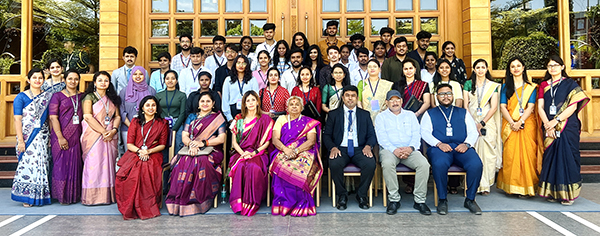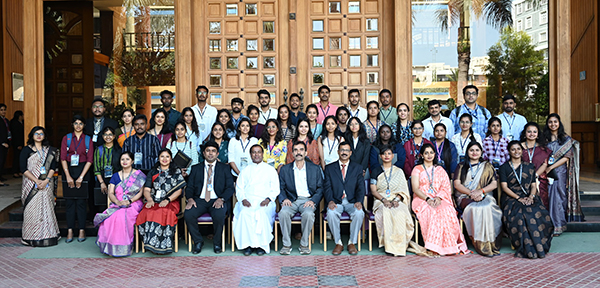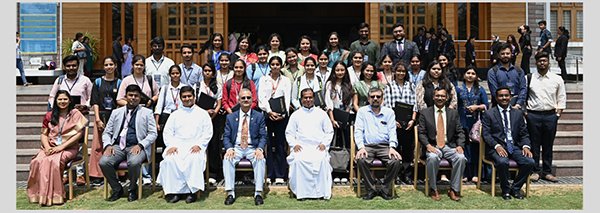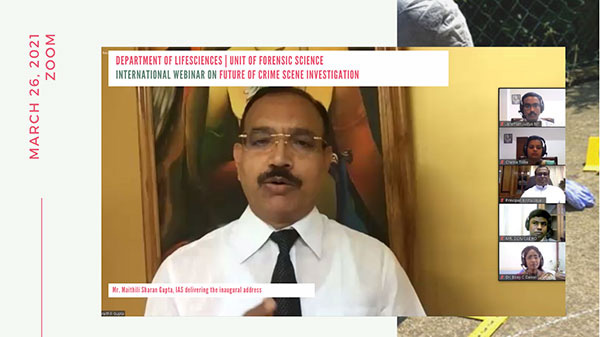Conferences
International Conference on Advanced Forensic Science (ICAFS 4.0) 2025
Date: 13 & 14 March 2025
The Department of Forensic Science at Kristu Jayanti College, Bengaluru, successfully organized the 4th International Conference on Advanced Forensic Science (ICAFS 4.0) on 13th and 14th March 2025. The conference brought together forensic experts, researchers, and academicians to discuss advancements in forensic science and its applications in criminal justice.
The conference was inaugurated by Dr. Rukmani Krishnamurthy, CEO & Director of Helik Advisory Lab, Mumbai, who highlighted the evolving role of forensic science in criminal investigations. The presidential address was delivered by Fr. Dr. Augustine George, Principal, Kristu Jayanti College, Bengaluru, emphasizing the importance of research and interdisciplinary collaboration in forensic science.
Dr. Rukmani Krishnamurthy, in her keynote address shared her extensive experience in forensic investigations and stressed the significance of integrating forensic advancements with law enforcement practices.
The conference featured five technical sessions with expert speakers from various forensic domains. Dr. Vandana Vinayak, Assistant Professor at Dr. Hari Singh Gour Central University, Sagar, spoke on forensic diatomology in drowning cases. Dr. Lata Gautam, Associate Professor at Anglia Ruskin University, UK, discussed forensic toxicology approaches for detecting and preventing drink spiking. Major Dr. Pramod G. Bagali, Chief Medical Officer & CEO of Witty Charman Group, Malaysia, introduced the No Cut Virtual Autopsy concept, demonstrating its significance in forensic pathology. Dr. Ankit Srivastava, Associate Professor at WB National University of Judicial Sciences, Kolkata, provided insights into forensic DNA analysis, forensic genealogy, and rapid DNA techniques. Prof. Dr. Ma Teresa G. De Guzman, Dean at the University of the Philippines, Manila, emphasized the role of behavioral science in forensic investigations, including suspect profiling and forensic interviewing techniques.
The conference witnessed over 200 delegates across the nation and a total of 43 research papers and 44 poster presentations were showcased, featuring contributions from over 30 institutions. The research presentations covered diverse forensic science disciplines, including forensic biology, digital forensics, crime scene investigation, forensic chemistry, forensic toxicology, and forensic anthropology.
The event served as a platform for knowledge exchange, academic collaboration, and discussions on the latest forensic advancements, reinforcing the importance of forensic science in modern criminal investigations and justice delivery.

International Conference on Advances in Forensic Science [ICAFS] 2024
Date: 01 & 02 February 2024
The department of Forensic Science at Kristu Jayanti College (Autonomous), Bengaluru organised the 2nd International Conference on Advances in Forensic Science (ICAFS), 2024 on 1st and 2nd February 2024 at the college campus. The conference was organised in a hybrid manner with delegates joining in person and over online video conferencing platforms.
The conference witnessed 5 plenary sessions addressed by eminent forensic science researchers and professionals and 76 research paper and poster presentations both offline and online. The plenary speakers included Mr. Renju Varghese, VP of Forensic & R&D, SISA, Information Security Bengaluru, India, Prof. Lorna Dawson, Head of Forensic Soil Science, The James Hutton Institute, United Kingdom, Dr. L Shashikumar, Scientific Officer, Biology Section, Regional Forensic Science Laboratory, Mysuru, India, Dr. Deepak V, Head, Department of Forensic Dentistry, MR Ambedkar Dental College, Bengaluru, India, Dr. S. K. Karthik, Professor and Head of the Department, Forensic Medicine and Toxicology, Dr. B. R. Ambedkar Medical College, Bengaluru, India. The plenary sessions covered topics ranging from quality assurance to advanced forensic techniques of the future.
The conference was attended by more than 200 delegates from across India. During the conference, there were 25 online paper presentations and 4 online poster presentations, alongside 12 offline poster presentations and 9 offline oral presentations. Delegates presented research spanning various fields including Forensic Biology, Digital Forensic Science, Forensic Psychology, Crime Scene Investigation, Forensic Medicine and Anthropology, Forensic Chemistry and Toxicology, Questioned Documents, and Fingerprinting. Each presentation offered intriguing insights and innovative ideas that captured the interest of the audience. Panellists meticulously reviewed the presentations and offered valuable insights to researchers, contributing to the advancement of their respective fields. The paper and poster presentations were assessed by scientific panels and best papers and posters were awarded.
The conference was inaugurated on 1st February by DR. Vinod J Lakkappan, Deputy Director Karnataka State Forensic Science Laboratory, Bengaluru, India In his inaugural address, Dr. Lakkappan emphasized the importance of forensic science and its crucial role in society and the legal system. He spoke about the recent advancements in forensic science techniques and instrumentation that have strengthened the evidentiary value of clues found at crime scenes. Fr. Dr. Augustine George, Principal, Kristu Jayanti College, Autonomous, Bengaluru, presided the inauguration and exhorted the delegates to make good use of the 2 days and aspire for greater heights in the field of forensic science.
The conference brought together leading forensic experts, researchers, and practitioners from India and abroad. They will be presenting their work through keynote addresses, invited talks, and paper presentations over two days. Topics covered include DNA forensics, digital forensics, forensic anthropology, forensic entomology, forensic psychology among others.
The conference was followed by a one-day workshop on February 3, which focused on specialized topics such as disaster victim identification, advanced forensic instrumentation, and digital forensics. The workshops aimed to provide hands-on training to participants on the latest techniques and tools used in forensic investigations.
This conference provided a platform to share knowledge on recent advances in forensic science and their applications in criminal justice delivery

International Conference on Advances in Forensic Science [ICAFS] 2023
Date: 20 & 21 April 2023
The department of Forensic Science at Kristu Jayanti College (Autonomous), Bengaluru organised the 2nd International Conference on Advances in Forensic Science (ICAFS), 2023 on 20th and 21st April 2023 at the college campus. The conference was organised in a hybrid manner with delegates joining in person and over online videoconferencing platforms.
The conference witnessed 6 plenary sessions addressed by eminent forensic science researchers and professionals and 76 research paper and poster presentations both offline and online. The plenary speakers included Dr. V V Pillay, eminent forensic toxicologist, Amrita Institute of Medical Sciences and Research Centre, Kochi, Shri. Keshav Kumar, IPS (retd.), Former ADGP, Gujarat state police, Dr. William Goodwin, Reader in Forensic Genetics, University of Central Lancashire, UK, Dr. Carlos A Guitierrez, Secretary of Consensus body of ASB CSI from AAFS Standards Board (ASB), USA, Dr. S Venkata Raghava, Professor And Head, Department Of Forensic Medicine And Toxicology , Bangalore Medical College And Research Institute and Dr G B Aravind, Associate Professor and Coordinator of Forensic Science, Department of Forensic Medicine and Toxicology, JSS Medical College, Mysuru. The plenary sessions covered topics ranging from quality assurance to advanced forensic techniques of the future.
The conference was attended by more than 150 delegates from across India. It also witnessed 76 presentations by researchers and academicians of research in the various disciplines of forensic science. The paper and poster presentations were assessed by scientific panels and best papers and posters were awarded.
The conference was inaugurated on 20th April by Shri. Keshav Kumar, IPS (retd.), Former ADGP, Gujarat state Police who listed the challenges facing the forensic science fraternity and outlined the government’s focus on improvement and modernisation of forensic services in the country. Fr. Jais V Thomas, Financial Administrator, Kristu Jayanti college presided the inauguration and exhorted the delegates to make good use of the 2 days and aspire for greater heights in the field of forensic science. Mr. Don Caeiro, Coordinator, Department of Forensic Science listed the progress made by the department and outlined the need for delegates to deliberate and discus the techniques and tools available to utilise them in their full potential.
The conference generated a lot of interest all around India and had delegates from neighbouring states and many faraway states of India.

International Conference on Advances in Forensic Science (ICAFS)
Date: 5th and 6th May 2022
The Unit of Forensic Science under the Life Science Department of Kristu Jayanti College started the two day conference titled “International Conference on Advances in Forensic Science”. With more than 300 participants, the conference was aimed at providing a platform for researchers, academicians, learners and industry professionals to discuss, deliberate and grow in the field of Forensic Science.
Inauguration: Future scope and challenges in the field of Forensic Science
The conference was inaugurated by Mr. Barry A Fisher, Retired Crime Lab Director, Los Angeles County, USA who is a renowned author and pioneer in the field of Forensic Science with more than 30 years of field experience. The resource persons included experts from the different major disciplines of Forensic science with a range of interesting topics.
The theme of sir’s talk was on the recent advancements and future scopes in the field. Mr. Fisher cited many new facets which are the talk of the future in the field and set the tone for the conference to ponder on the new unknown. He also spoke of areas which may require a lot of understanding and may promise to be challenging in the recent future and encouraged the delegates to use the two days valuably.
Technical Session 1: Advancements in Forensic Biology: the past, present and future.
The first technical session was addressed by Dr. Arun Sharma, Retd. Director, Directorate of Forensics Services, Himachal Pradesh, India. Sir with his vast experience could detail the sequence of improvement in the field of Forensic Biology from the past, beginning from the traditional means of investigating crimes using biological evidences.
Technical Session 2: Advances in anti-doping analysis from her experience in the field of sports forensics.
The second technical session was handled by Dr. Shobha Ahi, Deputy Director, Drug Control Centre, King’s College, London, UK. Beginning from collection of samples, mam explained the extraction techniques, the spot tests, the instrumental techniques available and the interpretation involved in these cases. The use of spectrophotometry and chromatography were explained in great detail. The recent advances were highlighted and the delegates could understand how the scope of the field is fast evolving and the relevance to forensic science and existing forensic standards in this field.
Technical session 3: Emerging challenges in Questioned Document Examination
The third technical session was from the physical science domain and focused on the field of Questioned Document Analysis. The session was addressed by Dr. J K Semwal, Retd. Senior Faculty from the prestigious LNJN NICFS, New Delhi, India. Sir systematically handled each lacuna and broadened the delegates’ thinking by pointing out the scopes available and listed the possible research areas which are emerging in the field. He explained about the use of information technology, computer systems, artificial intelligence, statistical modelling and also included the possibility of simulated handwriting and signatures.
Technical session 4: Advances in the digital and cyber forensic domain.
The fourth and final technical session was addressed by Dr. Meenakshi Mahajan, Deputy Director, Directorate of Forensics Services, Himachal Pradesh, India. The session had a rich mix of case studies, theories, legal provisions and possible emerging challenges in the field. Mam could also demonstrate the need of relying on digital evidences by using the internet to share a glimpse of the impact and frequency of these crimes.
Oral and poster presentations
There were presentations by delegates pertaining to the fields of Forensic Biology, Forensic Chemistry and Toxicology, Forensic Chemical and Biological Sciences, Forensic Physical Sciences and Digital Forensics. A total of 4 oral paper presentation sessions with 23 individual presentations were held. Each of them had interesting insights and new ideas which sparked interest in delegates. The panelists reviewed and provided valuable insights to the researchers to further the field of interest.

International Webinar On Future Of Crime Scene Investigation
The Unit of Forensic Science, Department of Life Sciences organized an international webinar titled ‘ Future of Crime Scene Investigation’ on 26th March 2021. The webinar was attended by the students of 1st and 2nd year UG Forensic Science and registered external participants. The webinar aimed to look into newer and more modern avenues in crime scene investigation in order to expose the students to newer updated knowledge. The webinar was conducted online due to the pandemic situation using the ZOOM platform. The webinar had a inaugural session followed by 4 scientific sessions which were handled by international speakers of good reputation and extensive experience in the field of forensic science.
The webinar had four diverse topics related to crime scene investigation - Accident Investigation and its dynamics, 3D Crime Scene Scanning - Evolution, Documenting and analysing a fire scene, Bullet trajectory and Blood spatter analysis in 3D and Crime Scene Reconstruction: From the Foundation to the Future. Each topic dealt with different domains in the field of crime scene investigation and it left a lasting message in the student’s minds.
The inaugural ceremony of the international webinar was presided over by Rev. Fr. Dr. Augustine George, Principal, Kristu Jayanti College, Bangalore. Rev. Fr. Augustine George highlighted the need for the field of forensic science in today’s society. He also re-iterated the need for practical knowledge being imparted to today’s students and how it is necessary to help them achieve great things in their career. He encouraged the unit of Forensic Science to look into newer avenues to improve the course and to have associations with institutes of repute in the field.
The chief guest of the inaugural ceremony Shri. Maithili Sharan Gupta, IPS, National President Crime Free Bharat Mission & Former DGP (Police Reforms) of Madhya Pradesh explained the scope, working and future ambitions of the Crime Free Bharat mission under the Govt. Of India. He praised the administration of Kristu Jayanti College for organizing a webinar on such a needful topic. He encouraged the delegates and students to take part and be benefitted through the one-day webinar.
Session 1: Accident investigation and its dynamics
The resource person for this session was Dr. Sally Lukose, Professor and Dean of School of Allied Health Sciences in Sharda University, Greater Noida is also the Head of Academics-cum-Forensic Science Department at the College of Traffic Management, Institute of Road Traffic Education (IRTE), Faridabad.
The introduction speech was presented by Mr. Jeremiah Justus, Assistant professor, Unit of Forensic Science, Department of Life Science. He detailed about the achievements of Dr. Sally Lukose and the briefing was followed by the inauguration of the lecture. Dr. Sally started the session by breaking down the meaning behind the word “accident” and explained how it is usually perceived to be. Ma’am then showed the delegates a few case studies which showcased certain accidents that have occurred in the past in India.
The resource person then proceeded to discuss the statistics of road accidents as given by WHO (World Health Organization) and also gave certain solutions on how to prevent such accidents from occurring. The delegates were then let into the working of a road accident investigation as they were explained about the ABC of Accident Investigation which was further broken down into 5 levels - reporting, at-the scene investigation, technical follow-up, accident reconstruction and cause analysis.
The participants of the lecture were also educated on some of the causes of accidents which commonly occur and were also informed about some aspects of accidents occurring due to intoxication and the role of Blood Alcohol Concentration in analyzing that. The knowledge on the importance of investigating the condition of light bulbs from the headlights of a vehicle after a crash was also imparted.
Towards the end of the session, Dr. Sally spoke about a very useful technology called PC Crash which helps in 3D reconstruction of an accident scene which will help investigators to have a better understanding about the happenings of an accident. The session was concluded by Dr. Sally answering some queries about the topic and she also implanted the idea in the participants that accident investigation should be looked at as an interdisciplinary approach.
Session 2: 3D Crime Scene Scanning - Evolution, Documenting and analyzing a fire scene
The resource person for this session was Dr. Satendra Yadav, Public Safety Expert & Crime Scene Trainer, Leica Geosystems, Switzerland.
He talked about 3D Crime Scene Scanning and its Evolution. He started off by explaining how 3D Scanning technology began and why documentation is necessary especially when it comes to the trials in court. He then proceeded to show various technologies that could be used to document and take necessary measurements of the crime scene. Students and delegates were also able to learn that these devices are known as photogrammetry devices. He also gave instances from real life cases that he had worked on where he had used photogrammetry as a means of documenting a crime scene. One of them was about a road accident case, for which with the help of the geo-coordinates they were able to conclude that it was not the vehicle’s fault but rather the angle of the road that was faulty.
He further went on to explain why measurements are an important factor when it comes to documentation of a scene and introduced to us a new technology that could provide accurate measurements. Using images, he explained the working of these devices and what they could carry out.
He also explained the use of total stations and 3d laser scanners. He talked about different scanners like the Leica C10, P50, BLK360 etc., including their functions and accuracy range. He proceeded to tell us that how, with the use of lasers in these scanners we could have a walkthrough in the crime scene with a 360-degree view. Students learned that these laser scanners could be used in cases involving – blood stain pattern analysis, shooting accident reconstruction, crash reconstruction etc. He gave the delegates an insight on different technologies and software that are useful in criminal investigation. He introduced the participants to a new forensic software solution called Map360 which is a desktop software allowing forensic professionals to import, analyse and create court ready deliverables. He gave examples using real cases and photographs. He showed cases that were solved with the help of these new technologies. Later, once he was done delivering the lecture, he went forward with answering questions from the delegates about the topic.
Session 3: Bullet trajectory and Blood spatter analysis in 3D
The resource person for this session Mr. Brad Joice is a Detective Sergeant, York regional Police, Ontario, Canada. The resource person used the session to help the delegates gain some knowledge on Bullet trajectory and blood spatter analysis in different cases handled by him in the past.
The session focused on roles played by a crime scene investigator, the changes brought about in the field of forensic science with this advancing technology and emphasized on the accuracy of 3D technology in ballistics and blood pattern analysis.
For a crime scene investigator, the main function is to document, collect and analyse evidences found in crime scenes.
Techniques used in the earlier times can be perceived as orthodox and less accurate methods of documentation when compared to 3D mapping. Right from using hand-held measuring tapes to 2D computer aided diagrams, and stepping up to the world of 3D scanning technologies and electronic deliverables, an evolution of processes is noticed.
Reminiscing the scenes from the famous series-Dexter, blood pattern analysis was put to light by Mr. Brad, focusing on how the string line method and older software programs like Backtrack from 1987 to Hemostat from 2006, can be a very time consuming and lesser efficient approach in comparison with the currently available devices and methods.
The multifaceted 3D scanning is a major invention that aided not only in blood spatter analysis but also the bullet trajectories.
The importance of shooting reconstruction to determine the bullets' area of origin was put to light. Usage of different tools like trajectory rods, string lines and lasers to visualise angles and motions in the trajectory was introduced. To young forensic science students, the session taken up by Mr. Brad was not just engaging but also an interesting learning platform that opened their eyes to how important it is to adapt and adopt to the changing times keeping in mind the basic principles that are part of regular curriculum.
Session 4: Crime Scene Reconstruction: From the Foundation to the Future
The resource person for this session Mr. Zachery Kowalske is a Detective & Crime Scene Reconstructionist at Roswell Police Department, Georgia, United States.
Mr. Zachery touched upon the different crime scene reconstruction techniques that were covered in the previous sessions and explained how they occupy the recent trend in crime scene documentation. After this, the resource person took the delegates and students through the different crime scene reconstruction techniques as postulated by different renown reconstructionists in the past. He showed glimpses of different text books and research papers which have devised new crime scene reconstruction techniques in the past. Students were able to understand the different theories which have led to today’s accepted reconstruction techniques.
The resource person finally explained the advantages and tamper-proof nature of 3D crime scene documentation technology. He used two case examples from his field experience to explain the crime scene documentation techniques that are put in practice and how blood patter analysis and bullet trajectory analysis help in crime scene reconstruction to a great deal. He took the delegates and students through the process of crime scene documentation used in two high profile cases that he had investigated. Students could understand the great detail to which a crime scene has to be analysed in order to make it able to be reconstructed in the lab.


